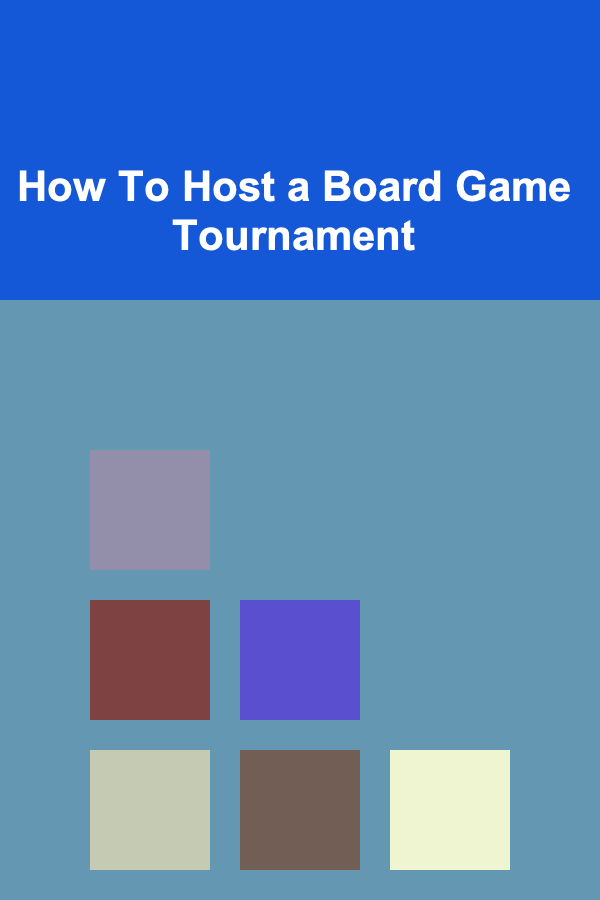
How To Host a Board Game Tournament
ebook include PDF & Audio bundle (Micro Guide)
$12.99$10.99
Limited Time Offer! Order within the next:

Hosting a board game tournament can be an exciting and rewarding experience. Whether you're gathering a group of friends for a casual game night or organizing a larger-scale competition, knowing how to structure and plan the event can elevate the experience for everyone involved. A well-executed tournament not only provides a sense of camaraderie and competition but also ensures that everyone has fun while enjoying the games they love.
In this article, we'll explore the essential steps for hosting a successful board game tournament, covering everything from choosing the right games to organizing logistics, handling participants, and adding some unique flair to your event.
Planning Your Tournament
Determine Your Goals
The first step in hosting a board game tournament is to define the goals of your event. Are you hosting a casual tournament for friends and family, or are you organizing a more competitive event? Your goals will influence the structure and tone of the tournament.
- Casual Fun: If the tournament is more about fun and socializing, you can opt for games that are easy to learn and have shorter durations. Your goal is to ensure that everyone enjoys the experience rather than worrying about competition.
- Competitive Play: If you're aiming for a serious competition, you'll need to select games that are balanced, require strategy, and can handle longer play times. You'll also want to establish clearer rules and set up a more formal tournament structure.
Select the Games
Choosing the right board games is crucial for the success of your tournament. Ideally, the games should fit your audience and the goals of the event.
Here are some factors to consider when selecting games:
- Number of Players: Make sure the games you choose can accommodate the number of participants. Some games are designed for small groups, while others work well with larger crowds.
- Game Duration: Consider how long each game will take. If you have a large number of participants, games with shorter playtimes might be necessary to avoid long delays.
- Complexity: Depending on your audience, you might want to choose games that are easy to learn or more complex strategic games. For example, games like Catan and Ticket to Ride offer a good balance of accessibility and strategy, while games like Twilight Struggle or Agricola are more complex and better suited for seasoned players.
- Replayability: Some games are highly replayable, which is essential if you're running a multi-round tournament. Look for games that remain interesting after several plays.
- Appeal to All Skill Levels: If your participants have different levels of experience, ensure the games are accessible and fun for all. You might opt for games with simple mechanics but plenty of room for strategic depth.
Popular board games for tournaments include:
- Strategy Games: Catan , Ticket to Ride , Carcassonne , Splendor
- Party Games: Codenames , Pictionary , Charades , Telestrations
- Deck-Building Games: Dominion , Marvel Legendary , Star Realms
- Card Games: Uno , Exploding Kittens , Cards Against Humanity
Format of the Tournament
Once you've selected your games, you'll need to decide on the structure of the tournament. There are several formats you can choose from, depending on your goals and the number of participants.
- Single Elimination: In this format, players compete in pairs, and the winner of each match advances to the next round. This format is fast and easy but leaves little room for players to make a comeback after losing.
- Double Elimination: A more forgiving structure where players have to lose twice before being eliminated. This allows participants a second chance and can keep things interesting.
- Round-Robin: In this format, each player or team competes against every other player/team. This is great for smaller tournaments and ensures everyone plays against each other, but it can be time-consuming.
- Swiss System: A hybrid between single elimination and round-robin, the Swiss system ensures that players are paired against others with similar records. This format is often used in larger-scale tournaments because it minimizes the number of rounds required.
- Team-Based: If you have a larger group, you might want to create teams. Team-based tournaments allow participants to collaborate, which can be fun and promote social interaction. This is particularly great for party games.
Set the Date and Location
Now that you know the games and format, it's time to set a date and location for your tournament. Consider the following:
- Date and Time: Choose a date that works for most participants. Weekends or holidays might be ideal, but make sure to check availability with your friends or participants.
- Location: The venue should be spacious enough to accommodate all players comfortably. Ensure there's enough seating and table space for the games. If you're hosting a large tournament, consider renting a community center or finding a suitable space that can fit everyone.
If you're hosting online, choose a virtual platform that supports multiplayer games, such as Zoom, Discord, or specialized board game platforms like Board Game Arena or Tabletopia.
Set a Budget
While some board game tournaments can be relatively inexpensive, others may require a significant investment. Consider the following:
- Prizes: If you're aiming for a competitive tournament, offering prizes can motivate participants. These could range from simple trophies and medals to more elaborate prizes such as gift cards or even board games themselves.
- Snacks and Drinks: Provide refreshments to keep players energized and hydrated. You can either supply snacks or ask participants to bring something.
- Materials: You'll need to consider things like score sheets, game timers, and any equipment required for setting up the tournament.
Organizing the Tournament
Create a Schedule
A clear and detailed schedule is essential to keep the tournament on track. Outline the start time, the duration of each round, and when breaks will occur. If you have a large group of participants, consider breaking the tournament into blocks, with each block focusing on specific games or rounds.
Here's a sample schedule for a one-day tournament:
- 10:00 AM: Registration and introduction
- 10:30 AM: Round 1 of the tournament
- 12:00 PM: Break and refreshments
- 12:30 PM: Round 2 of the tournament
- 2:00 PM: Lunch break
- 3:00 PM: Round 3 of the tournament
- 4:30 PM: Finals and prize ceremony
- 5:30 PM: Tournament closing
Keep Track of Results
You'll need a way to keep track of the results as the tournament progresses. Depending on the format you've chosen, use either a tournament bracket or a spreadsheet to track winners and matchups. You can use online tournament platforms or event management software to streamline this process.
For smaller tournaments, you can keep track of results manually by writing them down, while larger tournaments may benefit from digital solutions that allow participants to check results and matchups.
Manage the Game Logistics
As the tournament host, your role includes ensuring that all participants have the correct game pieces, the game rules are clear, and everything runs smoothly. Here's how to manage the logistics:
- Game Setup: Ensure that all the required materials (boards, cards, timers, etc.) are ready before the tournament starts. Have extra pieces available in case something gets lost.
- Rule Enforcement: Be clear about the rules of each game. Consider providing a brief overview of the rules before the tournament begins and having a rulebook on hand to settle disputes.
- Time Management: Monitor how long each round takes to ensure the tournament runs on schedule. If a game is dragging on, consider implementing a time limit to keep things moving.
Communicate with Participants
Good communication is key to a smooth tournament experience. Make sure everyone is informed about the rules, schedule, and expectations. You can send reminders in advance and keep participants updated during the event.
Adding Fun Elements to the Tournament
Themed Tournament
Adding a theme to your board game tournament can make the event feel more special. You can incorporate decorations, costumes, or a storyline into the event. For example:
- Medieval Fantasy: Players dress as knights, wizards, or dragons, and the games are themed around fantasy.
- Pirate Adventure: Incorporate pirate-themed games and decorations to create a fun and immersive atmosphere.
Social Media and Live Streaming
If you want to give your tournament a professional feel, consider streaming the event or sharing it on social media. Platforms like Twitch or YouTube allow you to broadcast live, and you can encourage participants to share their experiences on Instagram or Twitter using a specific hashtag.
After-Party or Closing Ceremony
Finish the tournament with a celebratory atmosphere. You can have a small awards ceremony to hand out prizes and trophies. If possible, host an after-party where participants can mingle and talk about the games, share strategies, or just relax after the competition.
Concluding Thoughts
Hosting a board game tournament is a fantastic way to bring people together, encourage friendly competition, and enjoy the thrill of gaming. Whether you're planning a casual gathering or a more competitive event, proper organization, the right games, and a clear tournament structure are key to success.
By following these steps, you can ensure that your tournament is memorable, fun, and well-executed. Get ready to roll the dice and watch your tournament unfold---there's no better way to experience the excitement of board gaming!
Reading More From Our Other Websites
- [Personal Care Tips 101] How to Use Brow Gel for a Long-Lasting Hold
- [Personal Investment 101] How to Protect Your Investments from Inflation
- [Personal Care Tips 101] How to Use Nail Polish Remover to Fix Nail Polish Mistakes
- [Survival Kit 101] The Best Survival Kit for Remote Cabin Owners Facing Winter Isolation
- [Organization Tip 101] How to Use Storage Ottomans for Dual-Purpose Spaces
- [Organization Tip 101] How to Use Digital Tools for Managing Rental Agreements
- [Home Budget Decorating 101] How to Refresh Your Living Room with Affordable DIY Decor
- [Digital Decluttering Tip 101] Spring Cleaning for Your Cloud: Organizing Files, Photos, and Backups
- [Home Party Planning 101] How to Plan a Memorable Home Party on a Budget
- [Mindful Eating Tip 101] The Science Behind Mindful Eating: Why Virtual Workshops Are the Future

How to Create VR Tours and Experiences
Read More
How to Host a Themed Movie Night with Friends
Read More
How to Implement a "One In, One Out" Policy for Supplies
Read More
How to Offer Professional Sound Engineering Services
Read More
Mastering the Cordless Drill: Power and Versatility Unleashed
Read More
How To Build a Thriving Small Business Empire
Read MoreOther Products

How to Create VR Tours and Experiences
Read More
How to Host a Themed Movie Night with Friends
Read More
How to Implement a "One In, One Out" Policy for Supplies
Read More
How to Offer Professional Sound Engineering Services
Read More
Mastering the Cordless Drill: Power and Versatility Unleashed
Read More